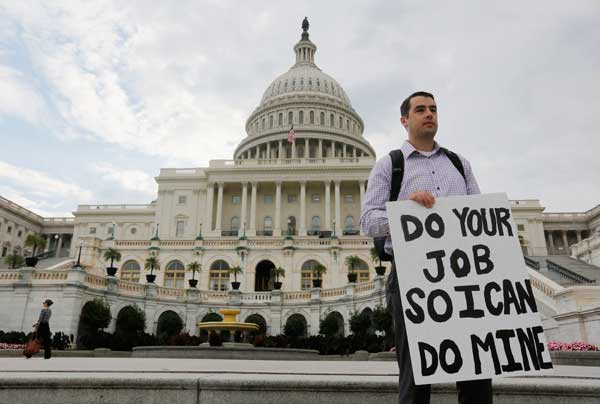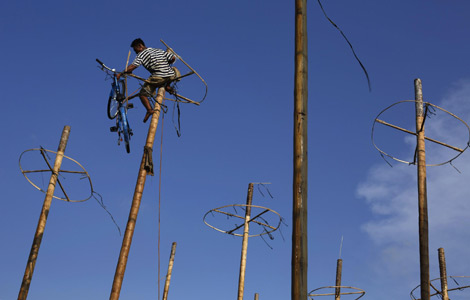Impasse in Congress shuts down services
Updated: 2013-10-02 00:05
By Chen Weihua in Washington (China Daily)
|
|||||||||||
US government closures just the beginning of more fiscal trouble
 |
|
A furloughed federal employee holds a sign on the steps to the US Capitol after the US Government shut down last night, on Capitol Hill in Washington October 1, 2013.[Photo/Agencies] |
Believe it or not, the government of the world's largest economy and only superpower has been on a partial shutdown since Tuesday. The unprecedented shutdown — the first in 17 years — that could put more than 800,000 federal workers on unpaid leave, came after the US Congress failed to find a compromise on a bill to fund government operations.
Though the Democratic-led Senate and the Republican-controlled House of Representatives had tried to broker a deal late into Monday night, the shutdown seemed inevitable after the Senate rejected the US Congress proposal that the temporary funding for the government should include a delay in the implementation of US President Barack Obama's health care program. No one knows if a compromise can be reached in the coming days.
"Unfortunately, the Congress has not fulfilled its responsibility. It has failed to pass a budget and, as a result, much of our government must now shut down until Congress funds it again," Obama said in a midnight broadcast to the US military.
Criticizing the US Senate for rejecting the offer, House Speaker John Boehner said, "I hope that the Senate will consider our offer to discuss the issue so that we can resolve the issue quickly for the American people."
Even as the Democrats and Republicans blamed each other for the shutdown, a Pew Center survey released on Monday showed that more than 26 percent of US citizens are upset with the federal government, while 51 percent were frustrated at the way things were going. Only 17 percent of the respondents said they were content with the way the federal government was functioning.
Meanwhile, a Gallup poll shows that US citizens are more likely to believe the current budget debate is an attempt by both sides to gain political advantage (47 percent) and not a battle over principles and future direction of government (37 percent).
The dysfunctional Washington politics, which seems to be in a constant election campaign mode, has left many wondering to what extent the US can still promote itself as a role model political system and a leader of the world.
Obama is scheduled to leave on Saturday for a weeklong trip to Indonesia, Brunei, Malaysia and the Philippines and attend the Asia Pacific Economic Cooperation summit and East Asia Summit. Secretary of State John Kerry and Defense Secretary Chuck Hagel are already in Asia.
Although US government departments deemed essential would still be functioning, the shutdown is likely to have a wide-ranging impact.
For example, the Statue of Liberty, a popular tourist destination in New York harbor, has been closed to visitors since the National Park Service, which oversees the statue, will not have the money to run the daily operations.
The park service will close more than 400 national parks and museums, including the National Zoological Park and the Smithsonian museums in the National Mall. The 24/7 web cam that allows people to watch the panda at the National Zoo will also be turned off. But zookeepers will still feed the pandas.
Commerce Secretary Penny Pritzker has postponed a scheduled talk on Tuesday morning at the Foreign Press Center in Washington DC clearly in a bid to deal with the chaos caused by the shutdown as 87 percent of the department's 46,420 employees would be sent home.
There have been 17 government shutdowns since 1976 but most of them lasted for a few days. The last and longest was in 1995-1996 when President Bill Clinton's government was shut down for 21 days.
The government shutdown this time might be just the first major drama in Washington in October. In less than three weeks time, the US government is expected to hit its debt ceiling. It means that unless the Congress raises the ceiling and allows the Treasury Department to issue new debt, the US may find itself unable to make all the payments, both at home and abroad.
chenweihua@chinadailyusa.com
Related Stories
US House votes to delay Obamacare 2013-09-29 10:41
Obama, Congress both losing public support: poll 2013-07-25 07:37
US Senate halts vote on use of force in Syria 2013-09-11 08:13
Today's Top News
Xi pledges to boost ties with Indonesia
Obama to meet congressional leaders
Xi opens up on his hopes for football World Cup glory
President Xi meets Indonesian counterpart on ties
US, ROK, Japan conduct joint military drills
Search for fishermen continues
Impasse in Congress shuts down services
Market in antiques booms in Shanghai
Hot Topics
Lunar probe , China growth forecasts, Emission rules get tougher, China seen through 'colored lens', International board,
Editor's Picks

|

|

|

|

|

|





